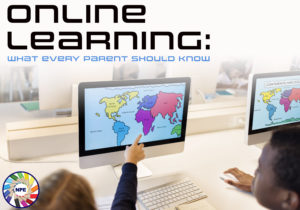Please check out and share this new NPE guide: What Every Parent Should Know about Online Learning.
As you know, many of the software programs being used in schools have uncertain value, and can undermine student privacy, engagement and authentic learning. I hope that this guide will help chip away at some of the massive hype that has surrounded the subject of online learning in recent years.
It offers questions parents should ask their children’s schools and districts before adopting computerized programs to deliver instruction, assessment or behavior management.
It also has sections examining the efficacy of some of the most over-hyped online programs like Summit PLP, Rocketship and New Classrooms, as well as widely used online assessments like MAP and i-Ready. The press release is below.
____
MEDIA ADVISORY FOR March 9, 2018
For more information contact: Carol Burris, NPE Executive Director, 718-577-3276, cburris@networkforpubliceducation.org
Kew Gardens, New York – Today the Network for Public Education (NPE) released a new report, Online Learning: What Every Parent Should Know, in response to the growing dependence on technology in K-12 education. Schools are increasingly implementing digital instruction, often requiring that students use online programs and apps as part of their classwork. Many students even attend a virtual, full-time charter school, never meeting teachers or classmates face to face.
Yet there is scant evidence of educational technology’s success and growing concerns regarding its negative impact. This guide presents a frank assessment of the intended and unintended consequences of online learning in K-12 school and offers questions parents should ask principals if their child’s school adopts computerized programs to deliver instruction, assessment or behavior management.
Rachel Stickland, Co-Chair of the Parent Coalition for Student Privacy, had the following to say about the report: “NPE’s Online Learning report is essential reading for anyone questioning the research behind the national push toward digital education. With this report in hand, parents can discuss their concerns with online learning confidently with school leadership – whether it’s the lack of evidence showing that it actually works, the political and moneyed interests advancing it, or how it places student privacy at risk.”
Dr. Faith Boninger of the University of Colorado Boulder researches and writes about commercial activities in schools. Commenting on the importance of the report she said, “As much as companies are eager to sell digital technology to schools, and schools are eager to increase children’s achievement, research does not support claims that shifting to digital educational platforms achieves the desired goals. What a growing body of research does indicate, however, is that excessive computer use by children leads to negative health effects such as vision and sleeping problems, social-emotional disturbance, and addiction to digital devices. NPE’s report on on-line learning is an important, timely, resource for parents. In plain language, its review of what we know about online learning shows that parents would do well to not accept promises or bland reassurances, but rather be extremely skeptical consumers. Armed with this report, parents will be able to ask administrators the very hard questions that must be answered adequately in order to justify the use of digital technologies to teach children.”
The 18-page guide is a parent-friendly review of the research on virtual schools, online courses, blended learning and behavior management apps. It also includes a discussion of the student privacy issues that arise when highly sensitive personal student data is collected by online programs and then distributed to third-party vendors without parent knowledge or consent.
The guide’s harshest criticism is reserved for virtual charter schools, whose academic ineffectiveness, coupled with fraudulent attendance practices, resulted in NPE’s recommendation that parents refrain from enrolling their children in online charters.
Based on the report’s findings, NPE President Diane Ravitch advises parents to “be wise consumers.” According to Ravitch, “Technology can be used creatively in the classroom by well-prepared teachers. But most of what is sold as ‘digital learning‘ is a sham that allows vendors to mine student data. Worse, online charter schools are educationally worthless. Students learn best when there is human interaction between teachers and students and among students. Parents must beware of false promises by profiteers.”
Online Learning: What Every Parent Should Know is available online at https://networkforpubliceducation.org/wp-content/uploads/2018/03/Online-Learning-What-Every-Parent-Should-Know.pdf.
The Network for Public Education (NPE) was founded in 2013 by Diane Ravitch and Anthony Cody. Its mission is to protect, preserve, promote, and strengthen public schools for both current and future generations of students. We share information and research on vital issues that concern the future of public education. For more information, please visit: networkforpubliceducation.org.
###

